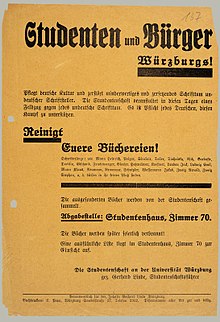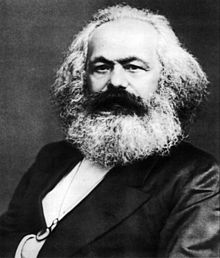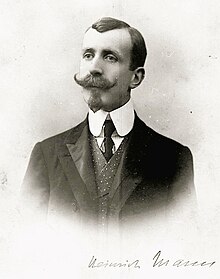List of books burned in 1933
Between May 10 and June 21, 1933 , as part of the “ Action Against the Un-German Spirit ” organized by the National Socialist German Student Union , public book burnings were carried out in many places in Germany . So-called “black lists” by the librarian Wolfgang Herrmann formed the basis for the selection of the works to be burned , according to which students and other university members sorted out “burnable” literature in university libraries, lending libraries and bookstores for the burns. ( See also: List of banned authors during the National Socialist era )
Blacklists

The Berlin librarian Wolfgang Herrmann had been working on a directory of writings to be sorted out for several years. The German student body turned to him with the request for "black lists", which should form the basis of the "purges" in the "action against the un-German spirit". As early as March 26, 1933, the first “List of books worth burning” appeared in the “Berlin Night Edition”. It was preliminary and incomplete and was soon replaced by a more thorough index. At the beginning of April 1933, a “Committee for the Reorganization of Berlin's City and People's Libraries” met in Berlin, to which the then 29-year-old Wolfgang Herrmann also belonged. As part of this committee, he worked on his black lists.
Nazi research over the past three decades has shown that neither the National Socialist book burning of May 10, 1933, nor the black list drawn up by Wolfgang Herrmann were commissioned or directed by the Reich Ministry for Public Enlightenment and Propaganda . The organization of the book burning was largely in the hands of the German student body (which was certainly supported by the Reich Ministry), and Herrmann's Black List was also the result of the self-initiative of the staunch National Socialist librarian; It was not until the following years that Goebbels and his ministry took over sole control of literature policy - after lengthy power struggles with Alfred Rosenberg . With the advancing institutionalization of literature policy, the number of forbidden books and authors grew steadily, cf. List of banned authors during the National Socialist era .
Herrmann's “black list” originally only had the function of blocking the indexed works from being lent in libraries. These were (in contemporary terminology):
- Scientific literature on Marxism and communism
- Asphalt literature emerged from the spirit of alienated urban literature
- Literature that smudges the experience of the frontline soldiers
- Literature that undermines the moral and religious foundations of our people
- Writings to glorify the Weimar Republic
- Literature that offends the legitimate feelings of national circles
Combustion lists
On the basis of these "black lists", Wolfgang Herrmann created further lists, which he then successively forwarded to the "Action against the un-German spirit" from April 26th. The originals are in the Würzburg State Archives (files of the DSt, 21 C 14 / I). With the help of these lists, the university and institute libraries were searched and, from May 6, 1933, bookshops and lending libraries were raided by student raiding parties and robbed of their valuable holdings. The public city and people's libraries were encouraged to “clean up” their holdings themselves and to hand over the discarded books to the student bodies for the book burnings on May 10th.
The lists were divided into the following subject areas:
- Fine literature (initially 71, then 127 writers and 4 anthologies)
- History (51 authors and 4 anthologies)
- Art (8 works and 5 monographs)
- Politics and Political Science (121 names and 5 works without an author)
- History of literature (9 authors' names)
- Religion, philosophy, pedagogy
The lists “History of Literature” and “Religion, Philosophy, Pedagogy” were not sent out by the student body until May 10 and 16, 1933, respectively, so that they were not yet used in the first book burnings.
A few days after the book burnings on May 10, 1933, the “black lists” were published on May 16 in the “ Börsenblatt für den Deutschen Buchhandel ” ( Börsenblatt für den Deutschen Buchhandel ); Dr. Herrmann proclaimed in it to "clean up the public libraries":
“The task that is set for the public library in the new state corresponds to Mussolini's slogan: 'Book and rifle - that is my command'. This means that the cultural and political goal of the public libraries lies in the spiritual detention, the total mobilization of the German people with the help of authentic literature. "
After the book burning, the relevant professional associations, the "Börsenverein des Deutschen Buchhandels" and the "Reichsverband der deutschen Leihbüchereien" - sometimes even in anticipatory obedience - hastened to systematically continue the "eradication of non-German literature" by means of appropriate orders and recommendations, the "cleansing" of libraries and publishing programs continued nationwide.
The “black lists” created by Herrmann were continuously supplemented and expanded, and a year later they comprised more than 3,000 titles of banned books and writings. A “list of harmful and undesirable literature” , which was published regularly from 1935, finally found 12,400 titles and the complete works of 149 authors.
The burned books
It is impossible to make a complete list of the "books burned". The list “Beautiful Literature”, which was first sent to the student body by the librarian Herrmann on April 26, 1933, was marked with the note “The list does not claim to be exclusive”, which subsequently also applied to the other lists so it must be assumed that the works indexed on the “black lists” only represented the core of the books actually burned. The local organizers had expressly been granted "any freedom" from the DSt main office:
“The list given below is to be used as the basis for the symbolic act in the act of combustion and the speech of the student representative should be used as literally as possible. Since it will practically not be possible in most cases to burn the entire books, a restriction to throwing in the fonts given in the following list should be appropriate. This does not exclude the possibility that a large pile of books will still be burned. The local organizers have every freedom. "
This circular from the DSt main office declared the burning of the works of the following 15 authors who were named in the nine fire sayings as binding: Karl Marx , Karl Kautsky , Heinrich Mann , Ernst Glaeser , Erich Kästner , Friedrich Wilhelm Foerster , Sigmund Freud , Emil Ludwig , Werner Hegemann , Theodor Wolff , Georg Bernhard , Erich Maria Remarque , Alfred Kerr , Kurt Tucholsky and Carl von Ossietzky (for the exact wording see: Book Burning 1933 ), but neither Sigmund Freud nor Theodor Wolff, Georg Bernhard or Carl von Ossietzky were found on the "Black lists".
Due to the granted "freedom" in the selection of books, the University of Halle-Wittenberg added authors such as Heinrich Heine , Klabund , Frank Wedekind , Albert Ehrenstein , Carl Zuckmayer and Friedrich Hollaender to its list. The burning of works by Thomas Mann is documented at least for Hanover, Hamburg, Göttingen and Cologne (although the German scholar Ernst Bertram had tried to intervene against the burning in Cologne ), without Thomas Mann being on the list of “Beautiful Literature”. In the text accompanying the “History” list, the removal of all pacifist, defeatist and pro-Bolshevik literature was requested, without these works being listed individually.
Newspaper report
A “cleanup” of the Heidelberg public library was promptly published in the newspaper report Raus mit dem Plunder. Municipal library clears and builds on October 20, 1937 described:
“From a wooden shed in the courtyard, which Pg. Zink gave the splendid name 'Judenstall', industrious hands keep fetching new piles of this patient paper. The name is read out and then the excrement of overheated dreamers is fired into the corner with verve. "
But it was not only "cleansing", but also "rebuilding" carried out. The same newspaper report states that the Lord Mayor of Heidelberg has donated 1,000 Reichsmarks to support the conversion of the literature on offer :
“For this sum, books about the Wehrmacht , about the struggle against Bolshevism , about nationality and homeland are bought. Brand new volumes with washable covers can be found on the shelves that have become vacant. "
Librarian Herrmann's lists
Nice literature
The black list “Beautiful Literature” was received by the DSt main office on May 2, 1933 with an accompanying letter from Herrmann :
“This list names all books and all authors who can be removed when the public libraries are cleaned up. Whether or not they all have to be eliminated depends on how far the gaps are filled with good new acquisitions. The list says nothing about the actual inventory of the individual libraries. It is only valid as a general aid for librarians and commissioners who are tasked with cleaning up. "
history
As a general rule:
“A.) Remove all pacifist and defeatist literature from the World War History Department . b.) Remove all pro-Bolshevik party literature from the Department of History of Russia (Gr) . "
|
|
art
|
|
Politics and Political Science
"Preliminary remark: The complete blockade of the Socialism department goes too far, in any case the non- and pre-Marxist German literature on socialism is to be excluded from the blockage. As a substitute for the discarded Marxist books, it is advisable to bring the non-partisan workers ' literature , especially from the departments of the workers' question, social policy , cooperative system , population question and labor service, more into circulation. In addition, care must be taken to ensure that 1 copy of the literature of scientific Marxism is kept in the poison cupboard of the study, main and city libraries. "
|
|
Literary history
|
|
Religion, philosophy, pedagogy
|
|
literature
- Dietrich Aigner: The indexing of "harmful and undesirable literature" in the Third Reich . Librarian Training Institute of the State of North Rhine-Westphalia, Cologne 1968 (term paper).
- Werner Treß: "Against the un-German spirit". Book burning in 1933 . Parthas, Berlin 2003, ISBN 3-932529-55-3 (again Vorwärts, Berlin 2008 ISBN 978-3-86602-869-2 . Both editions with 271 pages).
- Books burned in 1933 . With fire against the freedom of the spirit . In: Werner Treß (Hrsg.): Series of publications by the Federal Agency for Civic Education . tape 1003 . Federal Center for Political Education BpB, Bonn 2009, ISBN 978-3-8389-0003-2 (An anthology of 57 original texts, with short biographies. 638 pages. Complete list of all authors concerned in the appendix, alphabetically, not sorted by subject).
- Volker Weidermann : The book of burned books . Kiepenheuer and Witsch, Cologne 2008, ISBN 978-3-462-03962-7 (again as paperback: btb 73738, Munich 2009, ISBN 978-3-442-73738-3 ).
Web links
- Exiled books. Online publication of the list of writings banned by the National Socialists
- Library of burned books
- List of all prohibited books
Individual evidence
- ↑ a b Anselm Faust: The universities and the “un-German spirit”. The book burning on May 10, 1933 and its history . That was just a prelude ... Book burning Germany in 1933. Requirements and consequences . Akademie der Künste, Berlin 1983, pp. 31–50, here p. 38f.
- ↑ Gerhard Sauder: Preparation of the "Action Against the Un-German Spirit" . In: Gerhard Sauder (ed.): The burning of books . Hanser, Munich 1983, pp. 69-102.
- ↑ shoa.de Summary article on book burning
- ^ Joachim-Felix Leonhard (Ed.): Book burning. Censorship, prohibition, extermination under National Socialism in Heidelberg. Heidelberger Verlagsanstalt, 1983, p. 106. With contributions by Walter Engel a . a. Series: Heidelberger Bibliotheksschriften, 7
- ^ Text archive - Internet Archive
- ^ Text archive - Internet Archive
- ^ Text archive - Internet Archive




